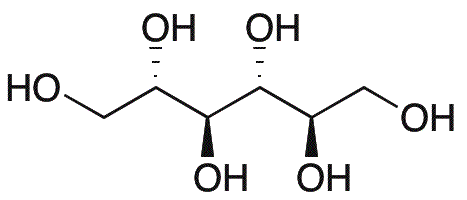Allitol is widely utilized in research focused on:
- Food Industry: As a low-calorie sweetener, it offers a sugar-like taste without the calories, making it ideal for sugar-free products and appealing to health-conscious consumers.
- Pharmaceuticals: Its properties as a sugar alcohol make it useful in drug formulations, enhancing the stability and solubility of active ingredients, which is crucial for effective medication delivery.
- Cosmetics: Allitol is incorporated in skincare products for its moisturizing properties, helping to improve skin hydration and texture, which is a significant benefit in cosmetic formulations.
- Biotechnology: In research, it serves as a substrate for microbial fermentation processes, enabling the production of biofuels and biodegradable plastics, aligning with sustainable practices.
- Health Supplements: It is used in dietary supplements as a sugar substitute, providing a sweet taste without affecting blood sugar levels, making it suitable for diabetics and those managing their weight.
General Information
Properties
Safety and Regulations
Applications
Allitol is widely utilized in research focused on:
- Food Industry: As a low-calorie sweetener, it offers a sugar-like taste without the calories, making it ideal for sugar-free products and appealing to health-conscious consumers.
- Pharmaceuticals: Its properties as a sugar alcohol make it useful in drug formulations, enhancing the stability and solubility of active ingredients, which is crucial for effective medication delivery.
- Cosmetics: Allitol is incorporated in skincare products for its moisturizing properties, helping to improve skin hydration and texture, which is a significant benefit in cosmetic formulations.
- Biotechnology: In research, it serves as a substrate for microbial fermentation processes, enabling the production of biofuels and biodegradable plastics, aligning with sustainable practices.
- Health Supplements: It is used in dietary supplements as a sugar substitute, providing a sweet taste without affecting blood sugar levels, making it suitable for diabetics and those managing their weight.
Documents
Safety Data Sheets (SDS)
The SDS provides comprehensive safety information on handling, storage, and disposal of the product.
Product Specification (PS)
The PS provides a comprehensive breakdown of the product’s properties, including chemical composition, physical state, purity, and storage requirements. It also details acceptable quality ranges and the product's intended applications.
Certificates of Analysis (COA)
Search for Certificates of Analysis (COA) by entering the products Lot Number. Lot and Batch Numbers can be found on a product’s label following the words ‘Lot’ or ‘Batch’.
Número de catálogo
Número de lote/lote
Certificates Of Origin (COO)
This COO confirms the country where the product was manufactured, and also details the materials and components used in it and whether it is derived from natural, synthetic, or other specific sources. This certificate may be required for customs, trade, and regulatory compliance.
Número de catálogo
Número de lote/lote
Safety Data Sheets (SDS)
The SDS provides comprehensive safety information on handling, storage, and disposal of the product.
DownloadProduct Specification (PS)
The PS provides a comprehensive breakdown of the product’s properties, including chemical composition, physical state, purity, and storage requirements. It also details acceptable quality ranges and the product's intended applications.
DownloadCertificates of Analysis (COA)
Search for Certificates of Analysis (COA) by entering the products Lot Number. Lot and Batch Numbers can be found on a product’s label following the words ‘Lot’ or ‘Batch’.
Número de catálogo
Número de lote/lote
Certificates Of Origin (COO)
This COO confirms the country where the product was manufactured, and also details the materials and components used in it and whether it is derived from natural, synthetic, or other specific sources. This certificate may be required for customs, trade, and regulatory compliance.

